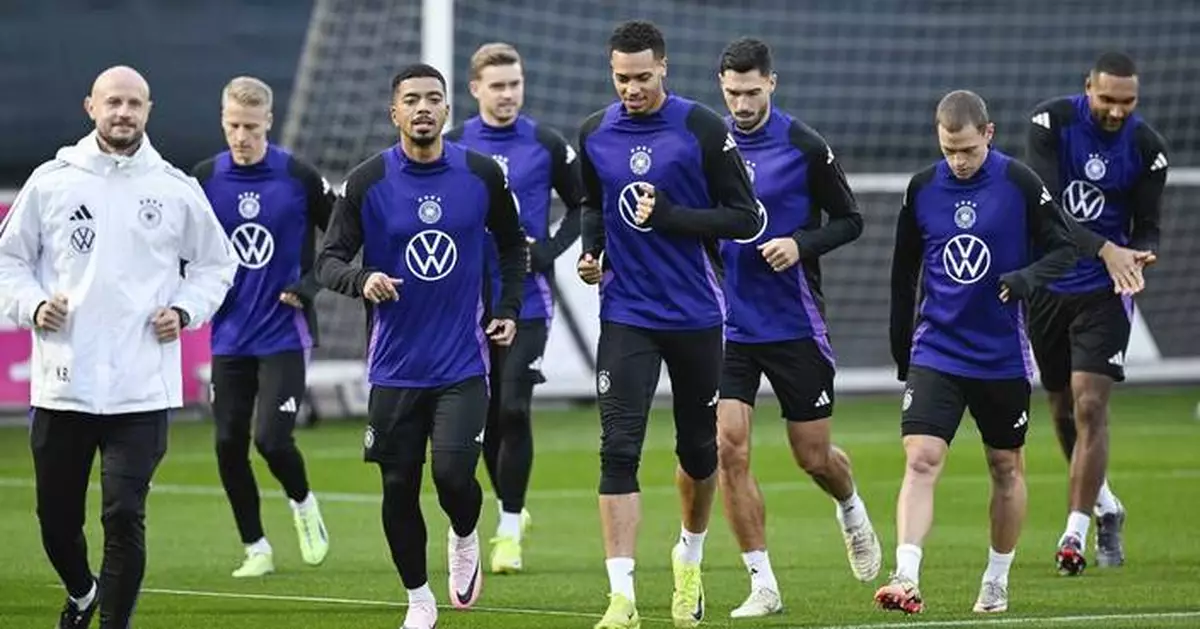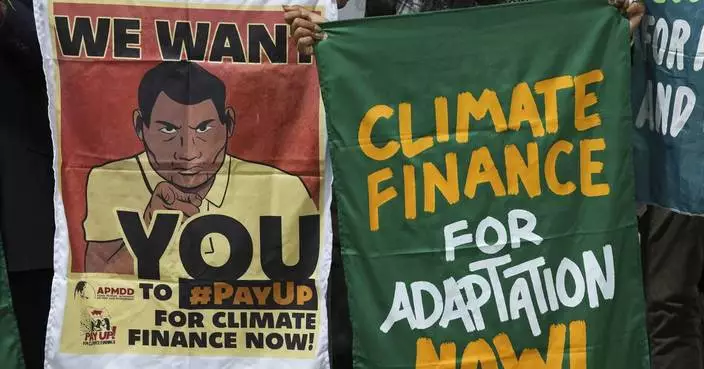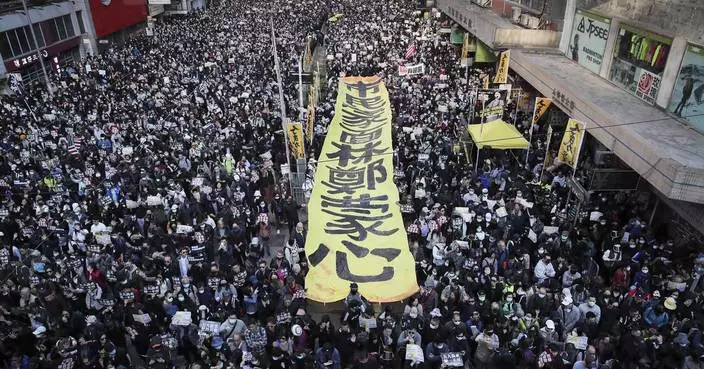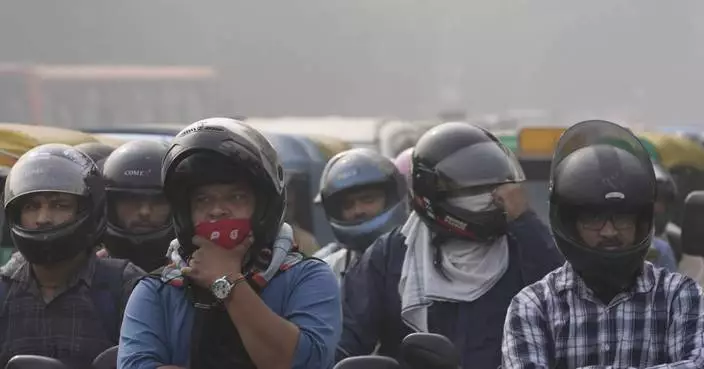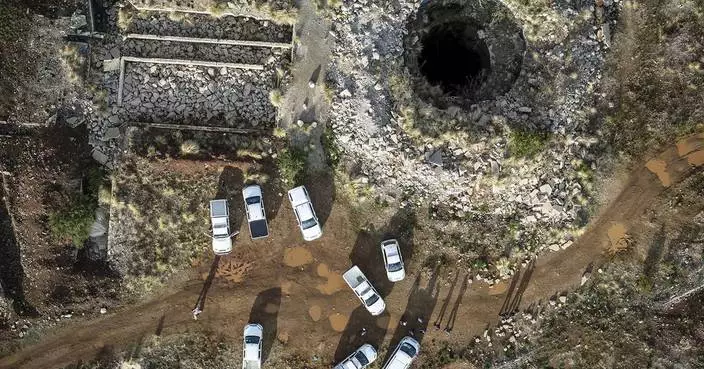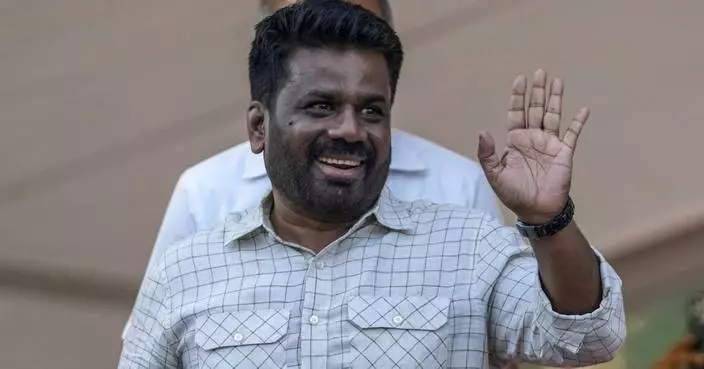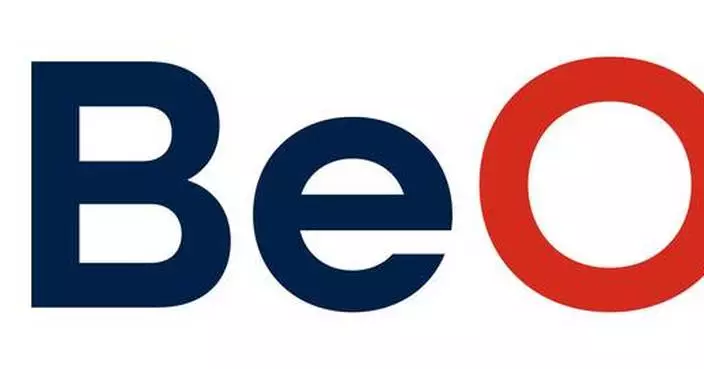GENEVA (AP) — The final rounds of Nations League games over the next week will bring the 2026 World Cup sharply into focus in Europe.
Standout games include Italy hosting France — who will again be without captain Kylian Mbappé — on Sunday, though the most consequential look like being Netherlands-Hungary on Saturday and Serbia-Denmark on Monday.
Click to Gallery
England goalkeeper Jordan Pickford practices during a training session at St George's Park, Burton upon Trent, England, Wednesday Nov. 13, 2024. (Nick Potts/PA via AP)
England's Rico Lewis runs during a training session at St George's Park, Burton upon Trent, England, Wednesday Nov. 13, 2024. (Nick Potts/PA via AP)
From left, Gustav Isaksen, Mads Roerslev Rasmussen, and Morten Hjulmand practice as the men's national football team trains in Helsingoer, Denmark, Wednesday, Nov. 13, 2024. (Ida Marie Odgaard/Ritzau Scanpix via AP)
England Interim Manager Lee Carsley looks on during a training session at St George's Park, Burton upon Trent, England, Wednesday Nov. 13, 2024. (Nick Potts/PA via AP)
England's Jude Bellingham, centre, practices during a training session at St George's Park, Burton upon Trent, England, Wednesday Nov. 13, 2024. (Nick Potts/PA via AP)
From left, Germany's Robert Andrich, Jonathan Tah, Leroy Sane and Chris Fuhrich attend a training session in Frankfurt, Germany, Monday Nov. 11, 2024, ahead of their Nations League soccer matches. (Uwe Anspach/dpa via AP)
The German soccer team attend a training session in Frankfurt, Germany, Monday Nov. 11, 2024, ahead of their Nations League matches. (Uwe Anspach/dpa via AP)
That’s because Nations League standings, and results that factor into the next FIFA rankings published on Nov. 28, will confirm seedings for the 12 European qualifying groups for the next World Cup in North America. FIFA makes an unusually complex draw on Dec. 13 in Zurich.
Off the field, France hosting Israel on Thursday is now a high-security operation, though fewer than 20,000 tickets had been sold days before the game at the 80,000-capacity Stade de France.
Street clashes in Amsterdam last week between local residents and visiting ultra fans of Maccabi Tel Aviv became a diplomatic incident, and led to a security review of all international games for Israeli teams.
Mbappé has not been selected by France for the second straight month. Norway captain Martin Odegaard has returned to London for more treatment on the ankle injury he got in a Nations League game in September.
Odegaard’s Arsenal teammates Bukayo Saka and Declan Rice opted out of England’s games in a second-tier group.
England also had Cole Palmer, Phil Foden and Trent Alexander-Arnold withdrawing ahead of playing at group leader Greece on Thursday and hosting Ireland on Sunday.
In such a busy season, with two extra Champions League games in January for many elite players, the Nations League is not a top priority.
When the groups finish Tuesday, the eight teams advancing to the first-ever quarterfinal stage in March will be known. It’s the latest expansion in the third-tier competition which crowns a champion at a Final Four mini-tournament in June.
The quarterfinalists will be those placing first and second in each of the four groups in top-tier League A. Spain and Germany already secured their positions after the two rounds played in October. France and Croatia look well set to join them.
Also in March, third-place teams in League A groups will face runners-up in the four groups in second-tier League B in promotion-relegation playoffs over two legs. All those teams involved cannot start their World Cup qualifying program until at least June. Some will start in September.
European soccer will send 16 teams to the first 48-team men’s World Cup being hosted in 2026 by the United States, Canada and Mexico.
Firstly, 54 of the 55 UEFA member countries will play in qualifying groups next year. Russia is still excluded during its invasion of Ukraine.
Only the 12 group winners in one year’s time advance direct to the tournament, before the other four European entries are decided by playoff brackets in March 2026.
Four of the 16 playoff teams will have won their Nations League group this month but then failed next year to finish in the top two of their World Cup qualifying group. The 12 runners-up in qualifying groups also get a second chance in the playoffs.
There are now 12 European qualifying groups instead of 10, each with four or five teams and no longer any with six. Top-seeded status in the World Cup draw is an even bigger chance to avoid tough opponents.
Those 12 top-seeded teams will be the eight Nations League quarterfinalists plus the four best of the rest ranked by FIFA. Those will include England and Belgium.
Hungary and Serbia have much to gain now. They can outperform their FIFA rankings — currently Nos. 32 and 33 respectively, and otherwise destined for seeding pot 2 in the Zurich draw — by rising to finish second in their Nations League groups.
Hungary goes to the Netherlands before hosting Germany on Tuesday. In the group led by Spain, Serbia goes to Switzerland on Friday then hosts Denmark.
Teams that fall into seeding pot 3 can face a difficult path to the World Cup.
Norway, with Erling Haaland likely in its team, are safely in pot 2 as the 24th-highest ranked team in Europe, though avoiding defeat at Slovenia on Thursday will help.
AP soccer: https://apnews.com/hub/soccer
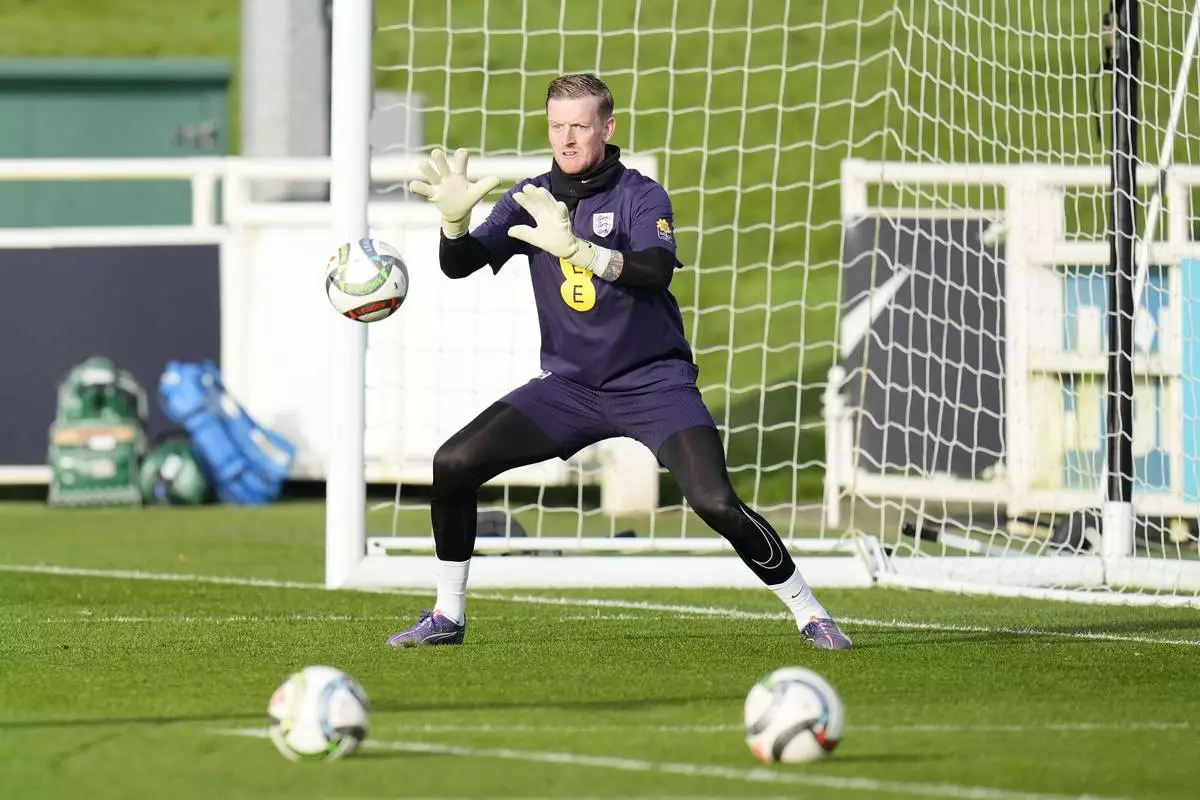
England goalkeeper Jordan Pickford practices during a training session at St George's Park, Burton upon Trent, England, Wednesday Nov. 13, 2024. (Nick Potts/PA via AP)
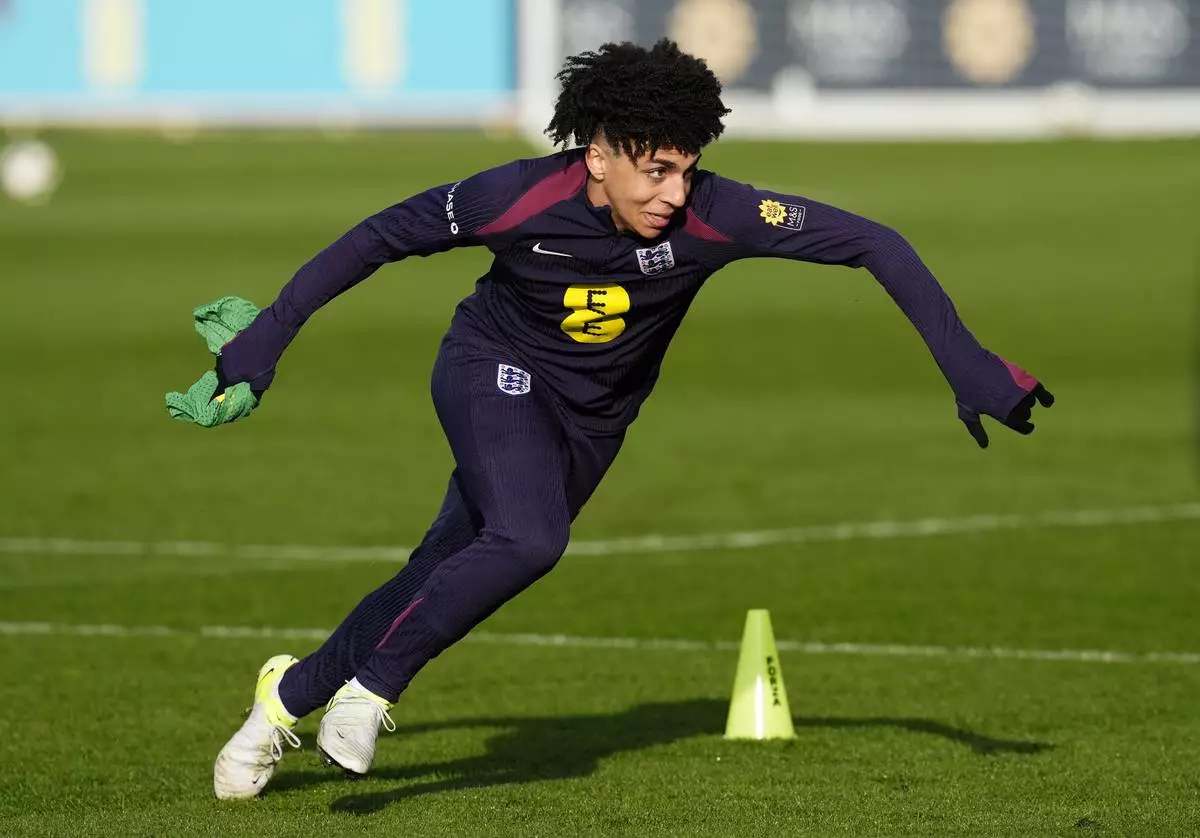
England's Rico Lewis runs during a training session at St George's Park, Burton upon Trent, England, Wednesday Nov. 13, 2024. (Nick Potts/PA via AP)
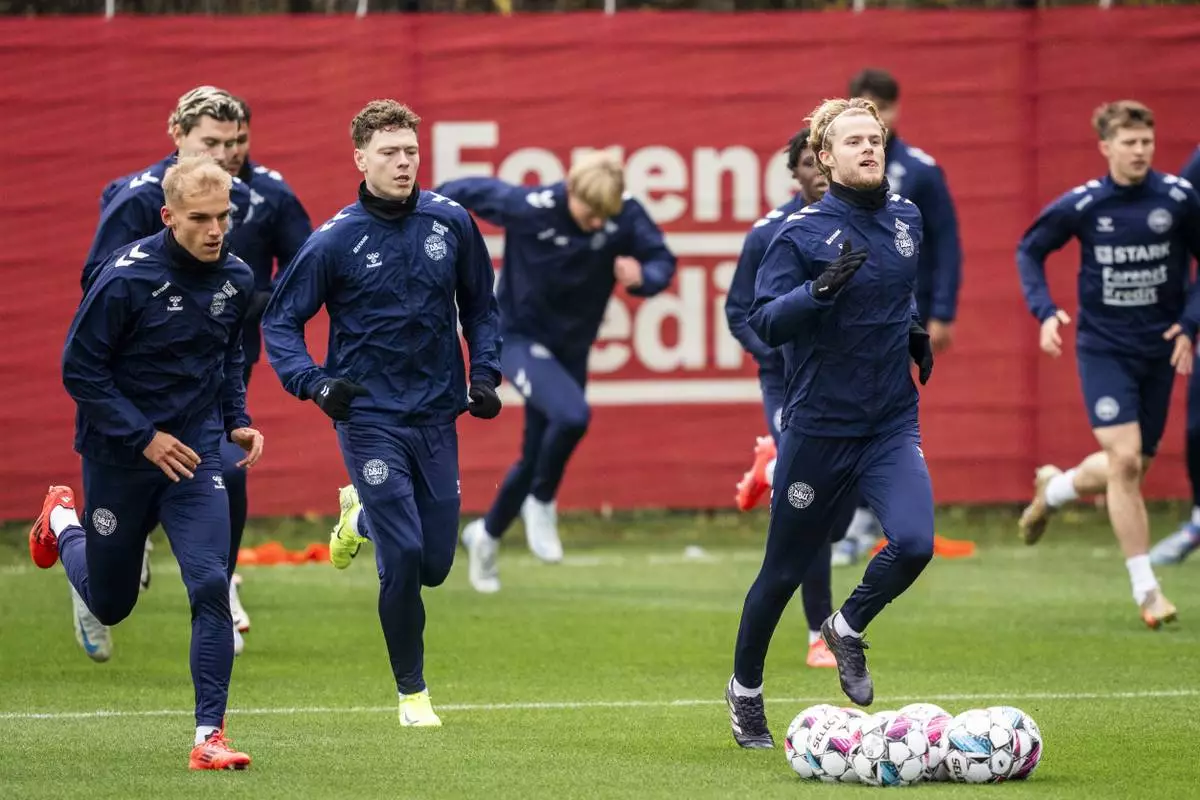
From left, Gustav Isaksen, Mads Roerslev Rasmussen, and Morten Hjulmand practice as the men's national football team trains in Helsingoer, Denmark, Wednesday, Nov. 13, 2024. (Ida Marie Odgaard/Ritzau Scanpix via AP)
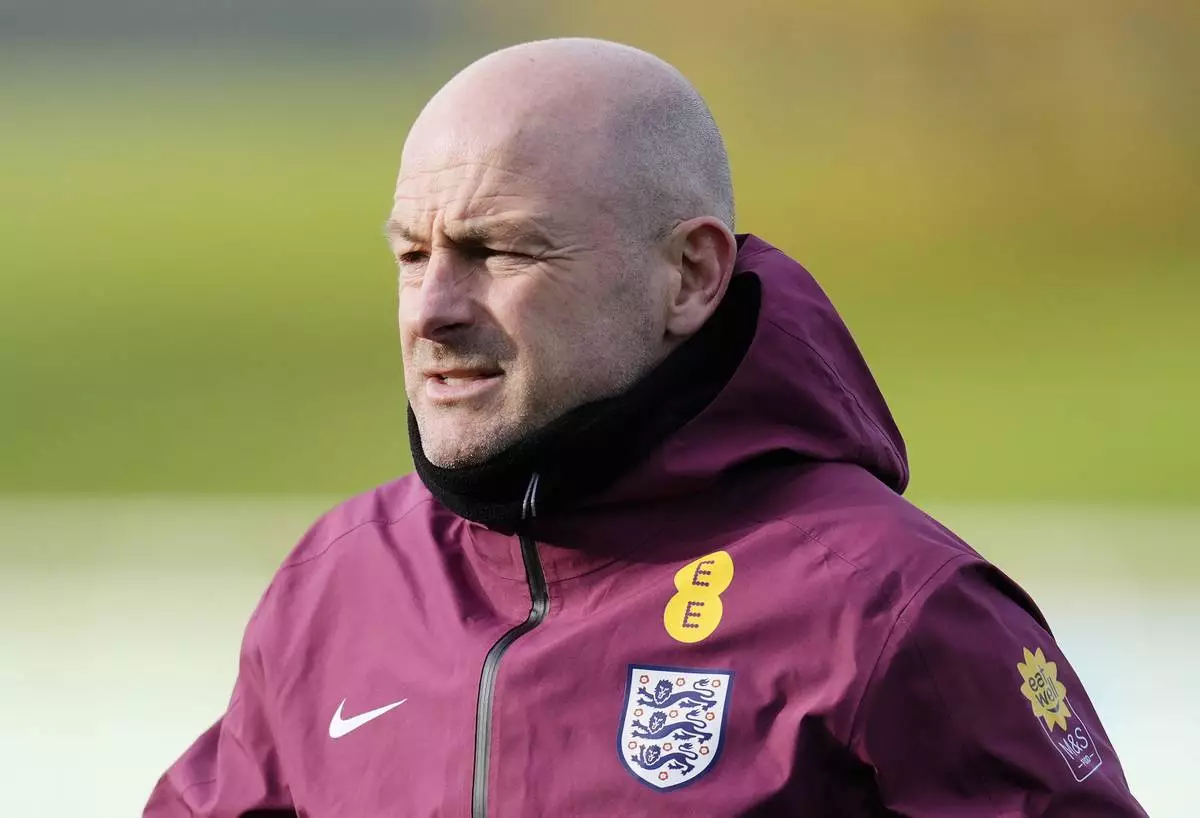
England Interim Manager Lee Carsley looks on during a training session at St George's Park, Burton upon Trent, England, Wednesday Nov. 13, 2024. (Nick Potts/PA via AP)
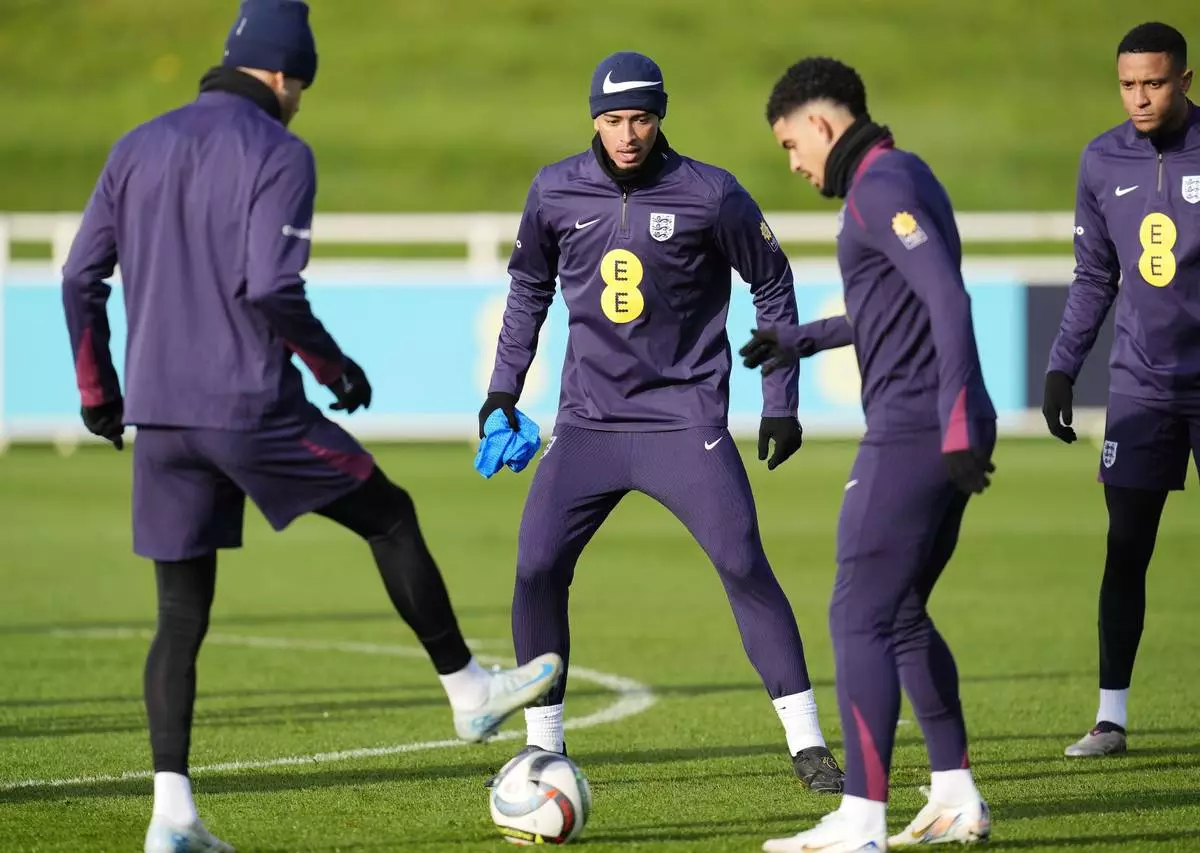
England's Jude Bellingham, centre, practices during a training session at St George's Park, Burton upon Trent, England, Wednesday Nov. 13, 2024. (Nick Potts/PA via AP)
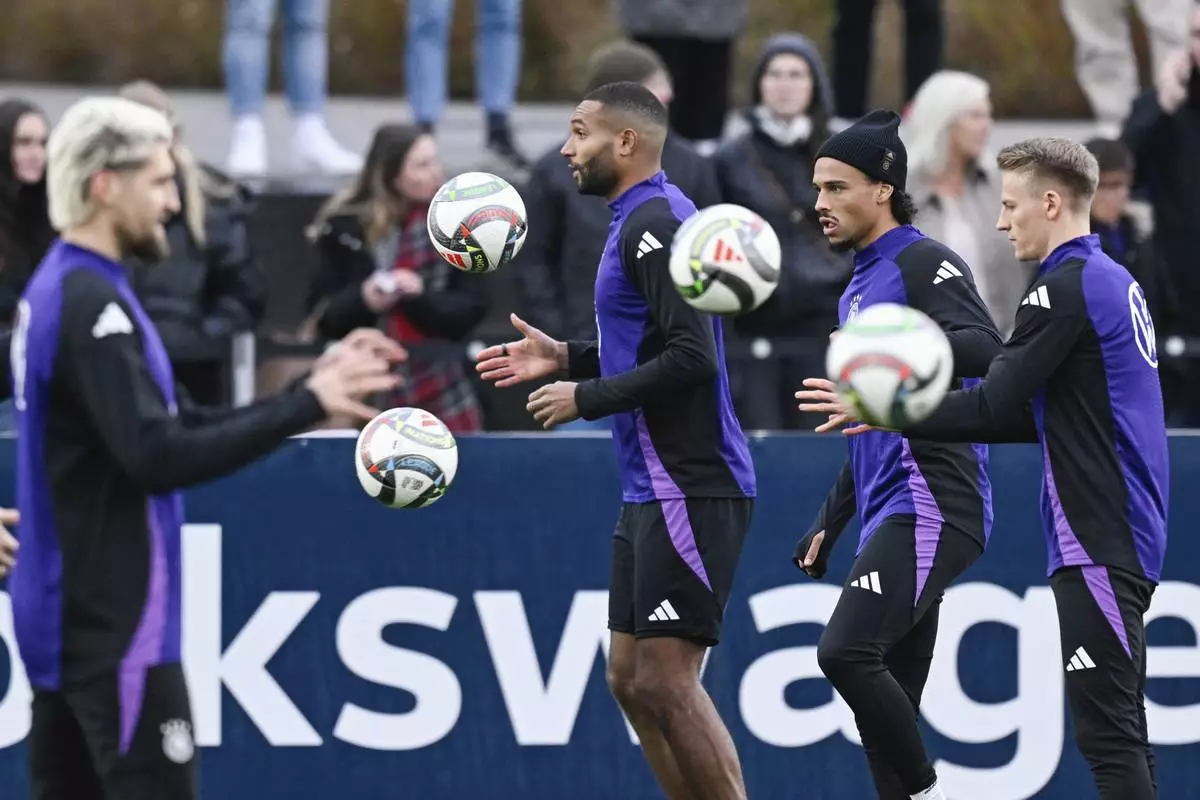
From left, Germany's Robert Andrich, Jonathan Tah, Leroy Sane and Chris Fuhrich attend a training session in Frankfurt, Germany, Monday Nov. 11, 2024, ahead of their Nations League soccer matches. (Uwe Anspach/dpa via AP)
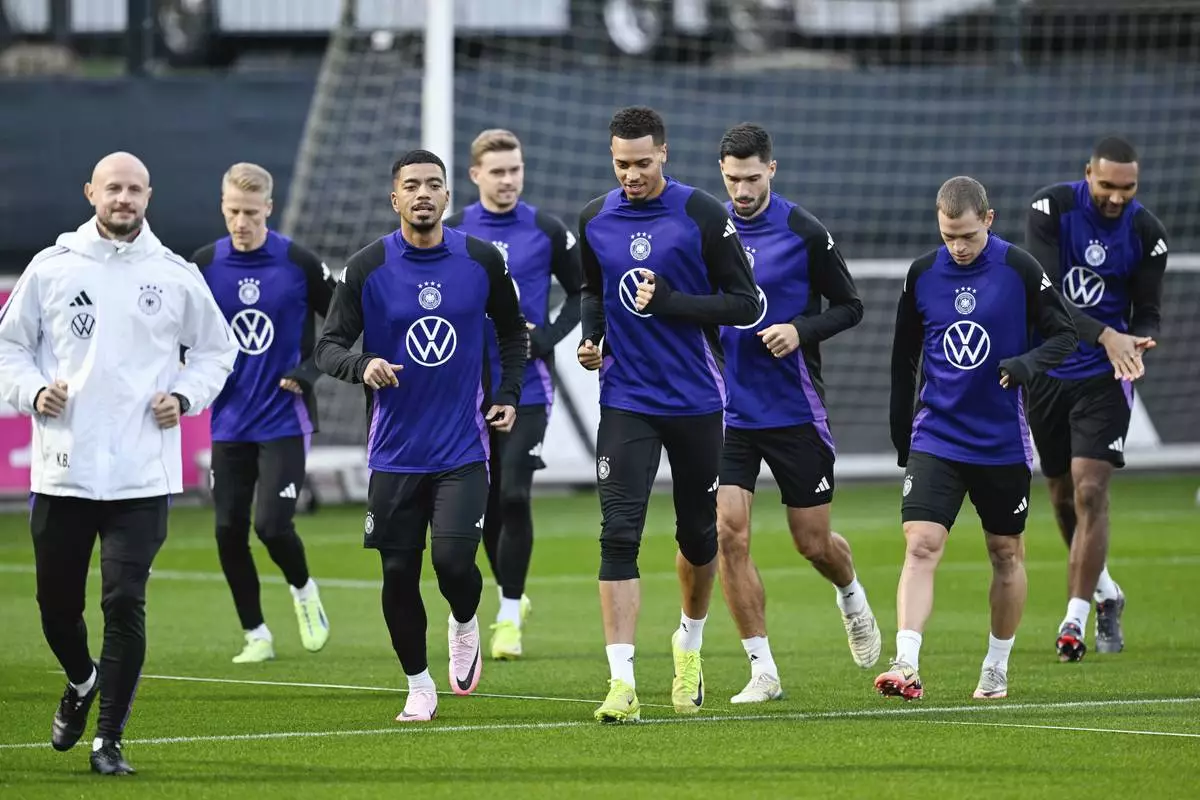
The German soccer team attend a training session in Frankfurt, Germany, Monday Nov. 11, 2024, ahead of their Nations League matches. (Uwe Anspach/dpa via AP)
DUBAI, United Arab Emirates (AP) — The head of the International Atomic Energy Agency warned Thursday that the “space for negotiation and diplomacy ... is getting smaller” over Iran's advancing atomic program as wars in the Mideast rage on and as President Donald Trump will return to the White House.
Rafael Mariano Grossi of the IAEA was visiting Tehran in an effort to restore his inspectors' access to Iran's program and answer still-outstanding questions over it, as he has on previous trips with limited success since Trump unilaterally withdrew the U.S. from the Islamic Republic's nuclear deal with world powers.
However, the remarks from both Grossi and his Iranian counterpart at a news conference suggested sizeable gaps still exist, even as some countries are pushing to take action against Iran at an upcoming IAEA Board of Governors' meeting.
“We know that it is indispensable to get, at this point of time, to get some concrete, tangible and visible results that will indicate that this joint work is improving (the) situation, is bringing clarification to things and in a general sense it is moving us away from conflict and ultimately war," Grossi said.
Since the deal’s collapse in 2018, Iran has abandoned all limits on its program, and enriches uranium to up to 60% purity — near weapons-grade levels of 90%.
Surveillance cameras installed by the IAEA have been disrupted, while Iran has barred some of the Vienna-based agency’s most experienced inspectors. Iranian officials also have increasingly threatened that they could pursue atomic weapons, something the West and the IAEA has been worried about for years since Tehran abandoned an organized weapons program in 2003.
Speaking at a news conference with Mohammad Eslami of the Atomic Energy Organization of Iran, Grossi stressed that while the IAEA and Iran continued to negotiate, time was not necessarily on their side.
“The fact that international tensions and regional tensions do exist — this shows that the space for negotiation and diplomacy is not getting bigger, it is getting smaller,” Grossi said.
Before appearing with Eslami, Grossi met with Iranian Foreign Minister Abbas Araghchi, who later wrote on the social platform X that “differences can be resolved through cooperation and dialogue.” However, he warned Tehran was “NOT ready to negotiate under pressure and intimidation.”
Some politicians have even suggested Iran abandon the Treaty on the Nonproliferation of Nuclear Weapons, known as the NPT, and pursue the bomb. Araghchi referred to Iran as “a committed member of NPT," though Eslami in his remarks warned Iran could retaliate if challenged at the upcoming IAEA Board of Governors' meeting. Grossi acknowledged some nations were considering taking action against Iran.
“We have repeatedly said any resolution seeking to intervene in the Islamic Republic of Iran’s nuclear affairs will be definitely followed by immediate reciprocal steps and we will not allow them to (exert) this kind of pressure," Eslami said.
Journalists at the news conference, as well as Eslami, criticized Israel for its longtime sabotage and assassination campaign targeting Iran's nuclear program. Some noted Israeli officials had threatened Iran's nuclear sites as targets for potential retaliation as Iran and Israel trade direct attacks amid the ongoing Israel-Hamas war in the Gaza Strip and Israel's ground and air offensive in Lebanon.
“The answer is in what we do here, what we, the IAEA, and Iran can do in terms of solving the questions at hand," Grossi said, describing “a situation of tension” with Iran's nuclear program at its center.
“I am here to work with Iran, (to) try to find adequate solutions to ease tensions, to move forward. This is my target. This is my concern. And I am confident that we are going to be able to do it," he said.
But as the two men ended the news conference to shouted questions from journalists, neither had offered any sign a breakthrough was imminent.
Associated Press writer Nasser Karimi in Tehran, Iran, contributed to this report.
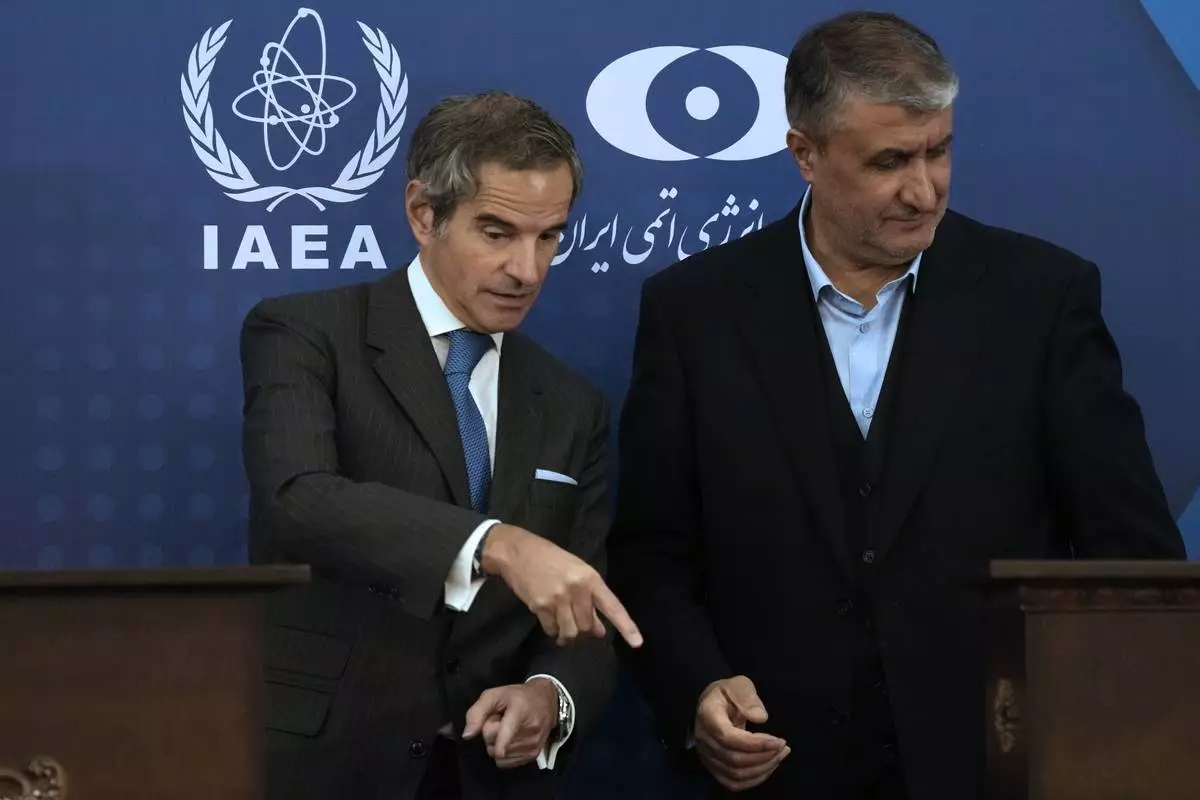
International Atomic Energy Agency, IAEA, Director General Rafael Mariano Grossi, left, gestures at the conclusion of his joint press conference with Iran's Atomic Energy Organization head Mohammad Eslami in Tehran, Iran, Thursday, Nov. 14, 2024. (AP Photo/Vahid Salemi)
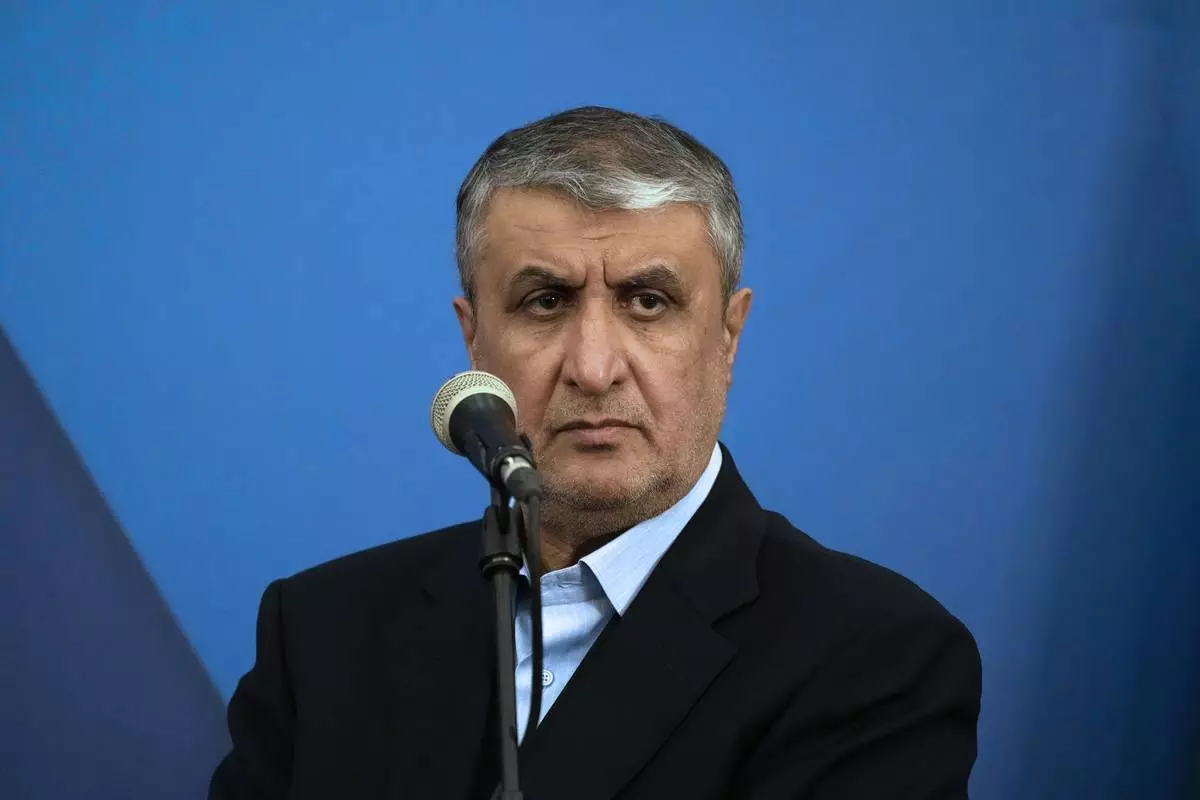
Head of Atomic Energy Organization of Iran Mohammad Eslami listens during his joint press conference with International Atomic Energy Agency (IAEA) Director General Rafael Mariano Grossi in Tehran, Iran, Thursday, Nov. 14, 2024. (AP Photo/Vahid Salemi)
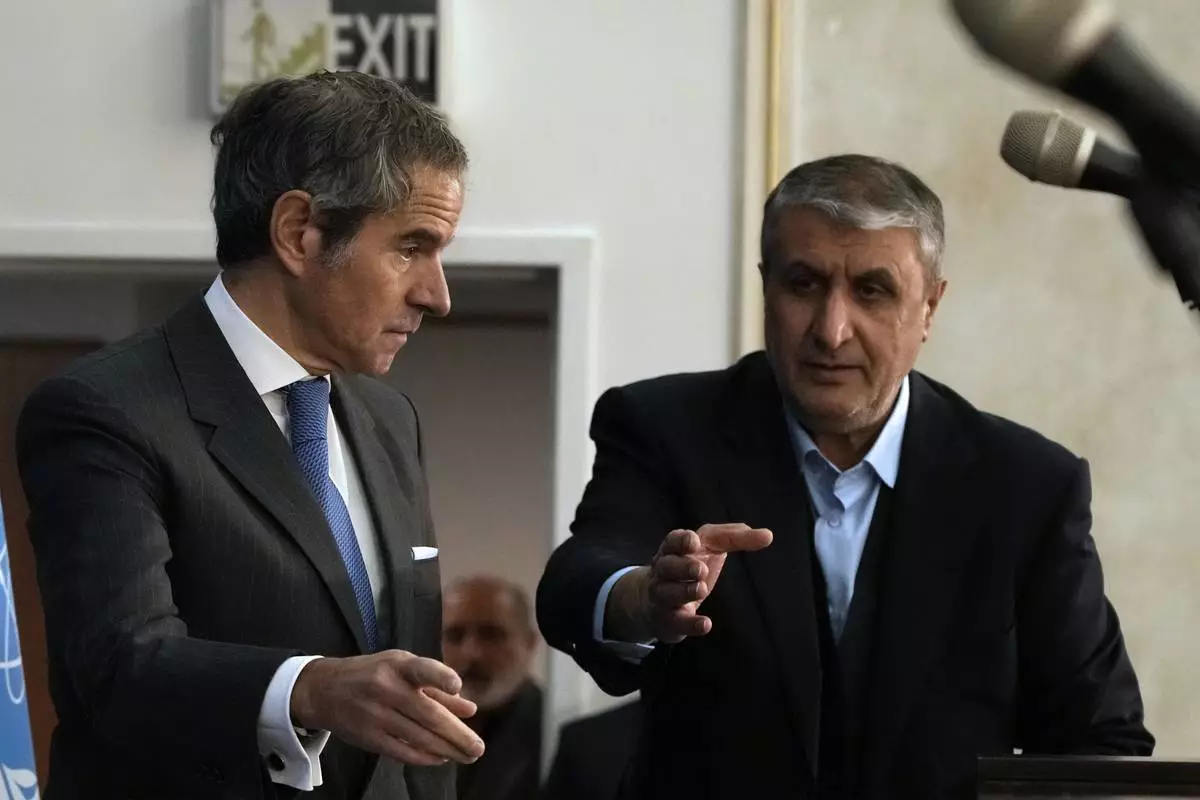
International Atomic Energy Agency, IAEA, Director General Rafael Mariano Grossi, left, and head of Atomic Energy Organization of Iran Mohammad Eslami gesture as they arrive for a press conference in Tehran, Iran, Thursday, Nov. 14, 2024. (AP Photo/Vahid Salemi)
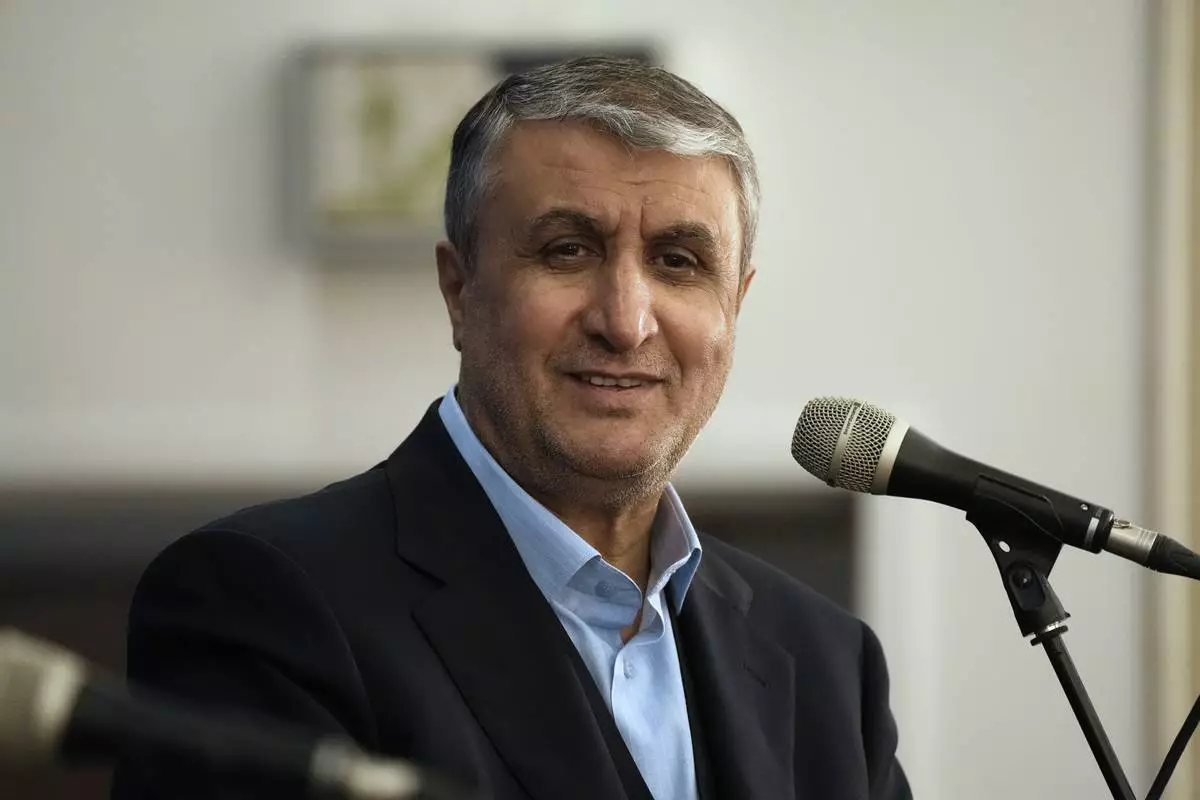
Head of Atomic Energy Organization of Iran Mohammad Eslami listens during his joint press conference with International Atomic Energy Agency (IAEA) Director General Rafael Mariano Grossi in Tehran, Iran, Thursday, Nov. 14, 2024. (AP Photo/Vahid Salemi)
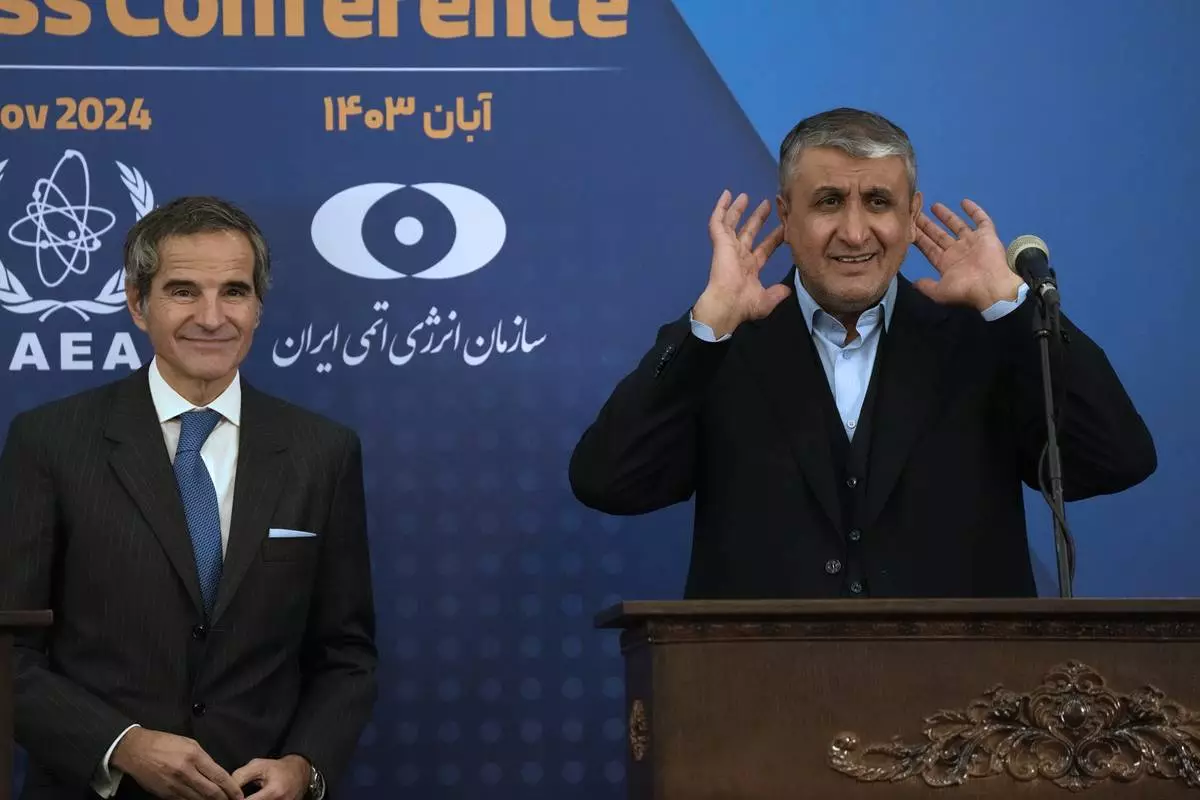
Head of Atomic Energy Organization of Iran Mohammad Eslami, right, tries to listen to a journalist at the conclusion of his joint press conference with International Atomic Energy Agency (IAEA) Director General Rafael Mariano Grossi in Tehran, Iran, Thursday, Nov. 14, 2024. (AP Photo/Vahid Salemi)
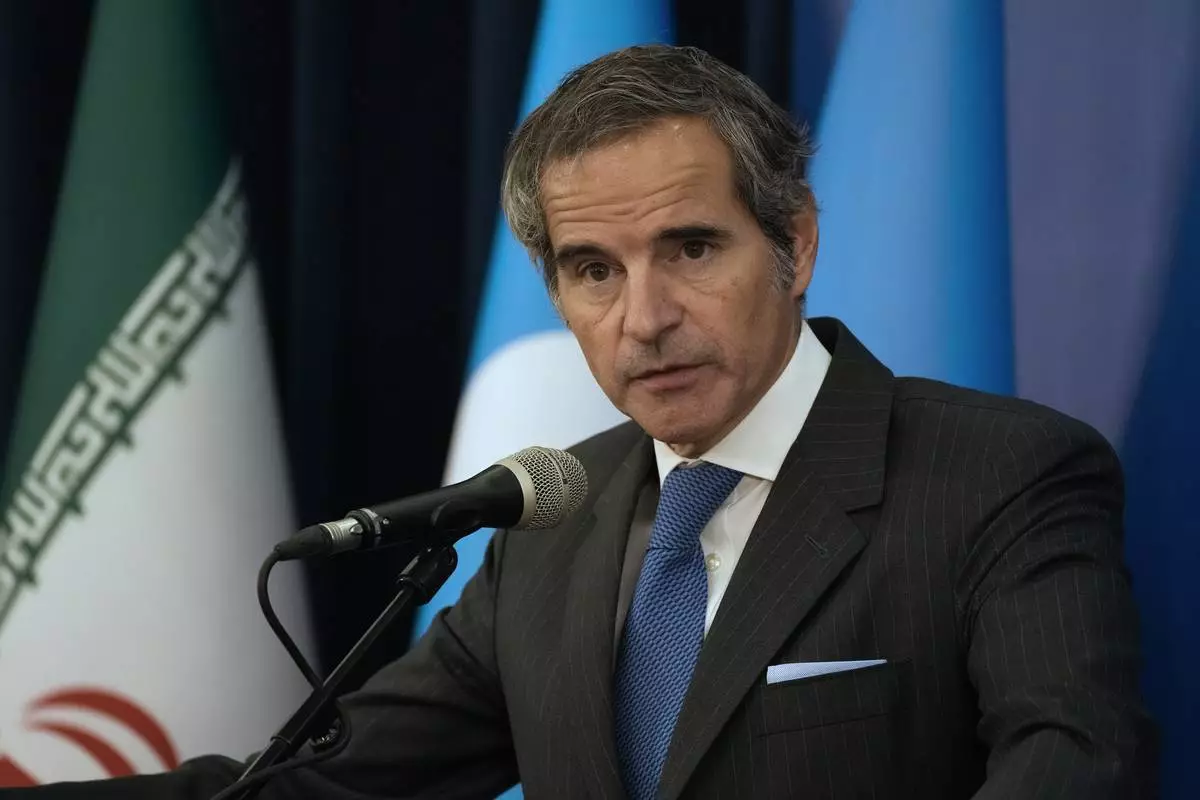
International Atomic Energy Agency (IAEA) Director General Rafael Mariano Grossi speaks during a joint press briefing with head of Atomic Energy Organization of Iran Mohammad Eslami in Tehran, Iran, Thursday, Nov. 14, 2024. (AP Photo/Vahid Salemi)
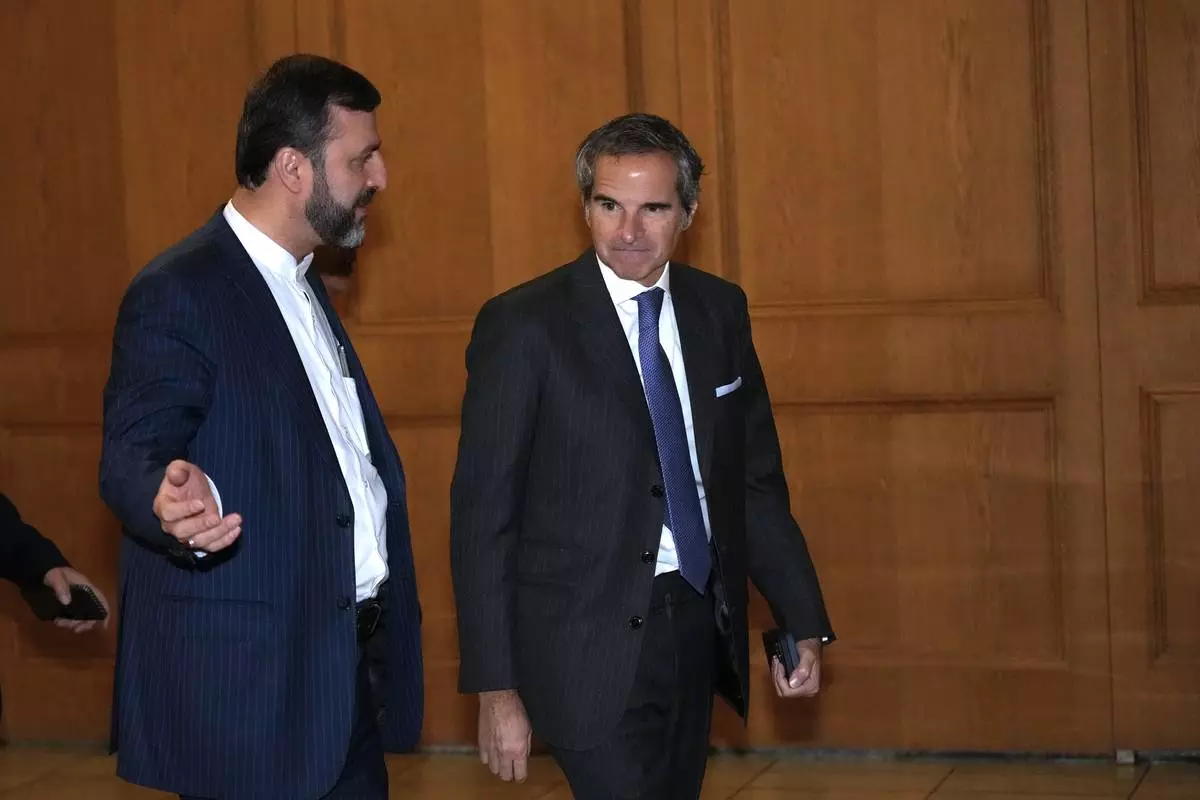
CORRECTS TO INTERNATIONAL ATOMIC ENERGY AGENCY - International Atomic Energy Agency (IAEA) Director General Rafael Mariano Grossi, right, arrives for a meeting with Iranian Foreign Minister Abbas Araghchi as he is accompanied by Deputy Foreign Minister Kazem Gharib Abadi, in Tehran, Iran, Thursday, Nov. 14, 2024. (AP Photo/Vahid Salemi)
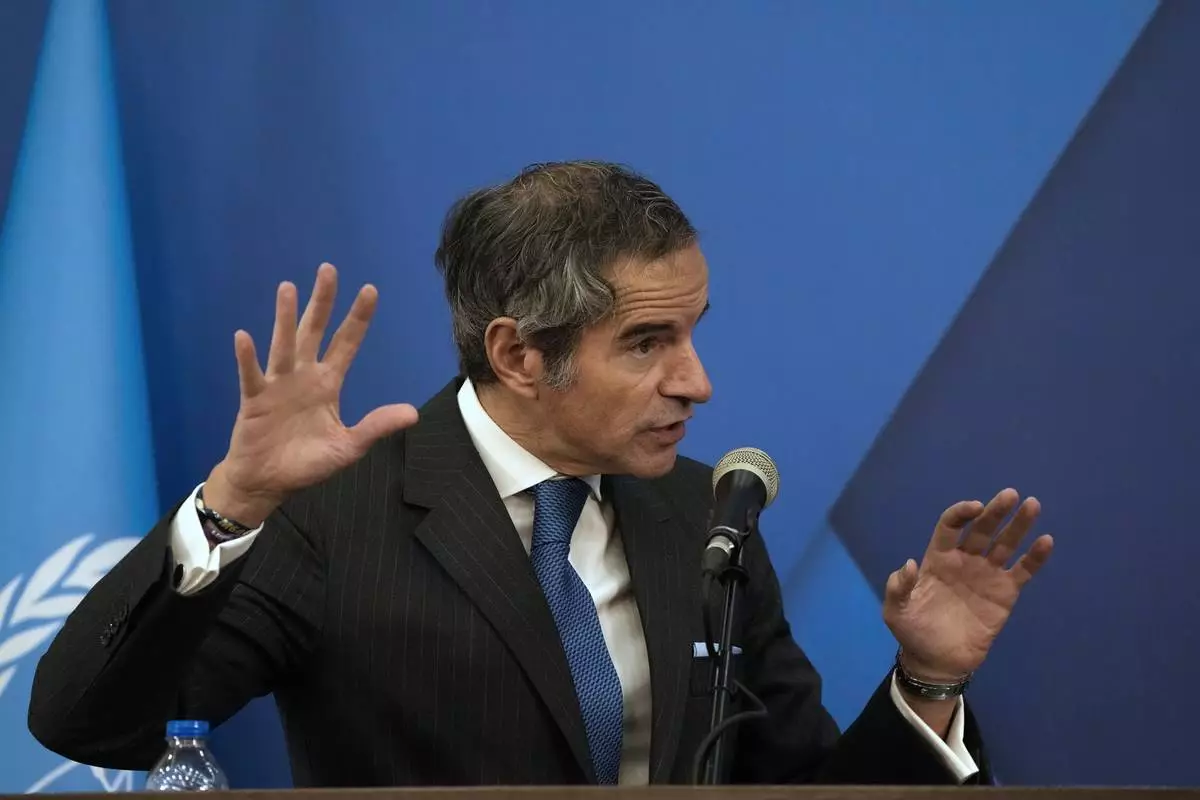
International Atomic Energy Agency, IAEA, Director General Rafael Mariano Grossi speaks during a joint press briefing with Iran's Atomic Energy Organization head Mohammad Eslami in Tehran, Iran, Thursday, Nov. 14, 2024. (AP Photo/Vahid Salemi)
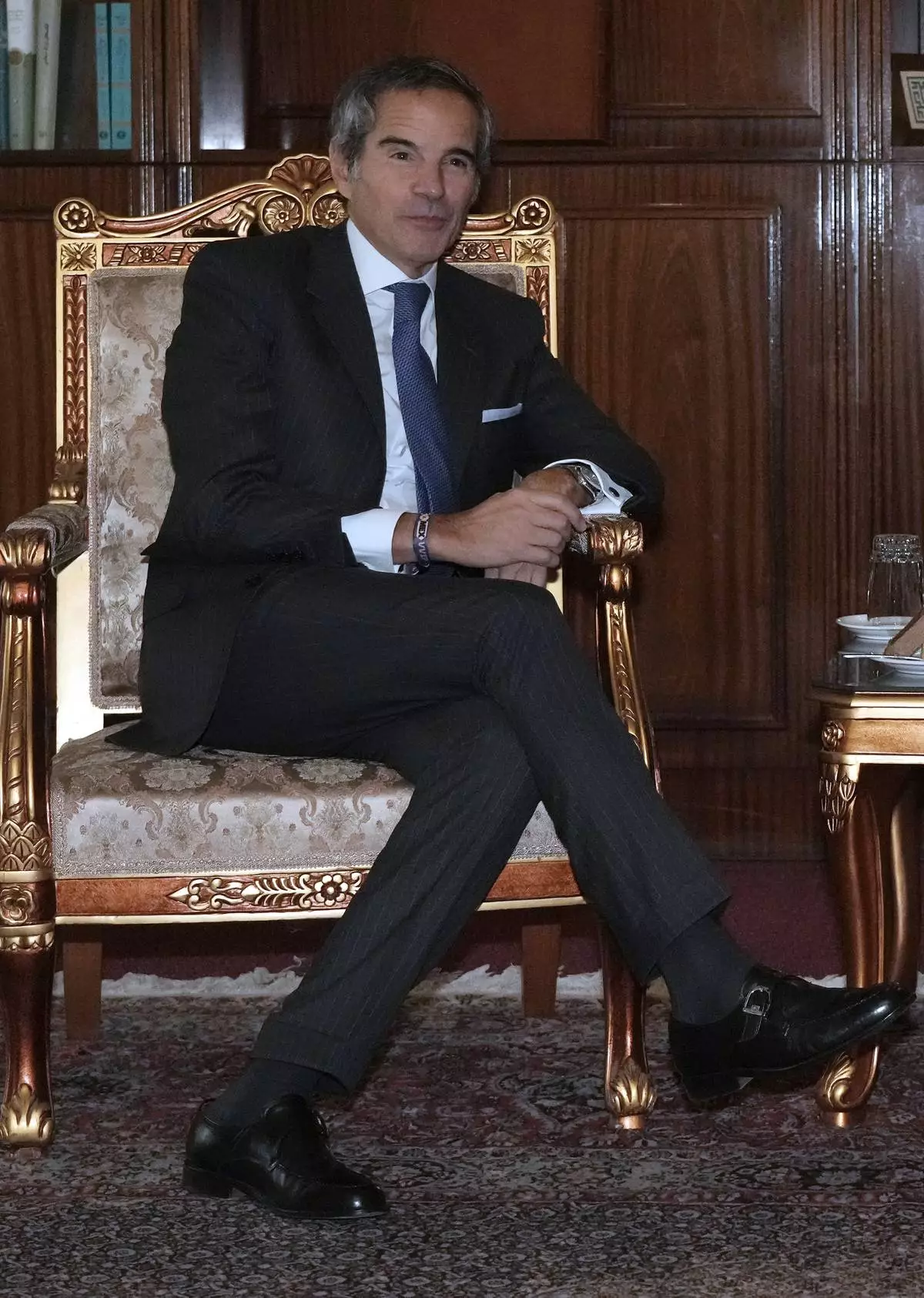
International Atomic Energy Agency (IAEA) Director General Rafael Mariano Grossi sits during a meeting with Iranian Foreign Minister Abbas Araghchi in Tehran, Iran, Thursday, Nov. 14, 2024. (AP Photo/Vahid Salemi)
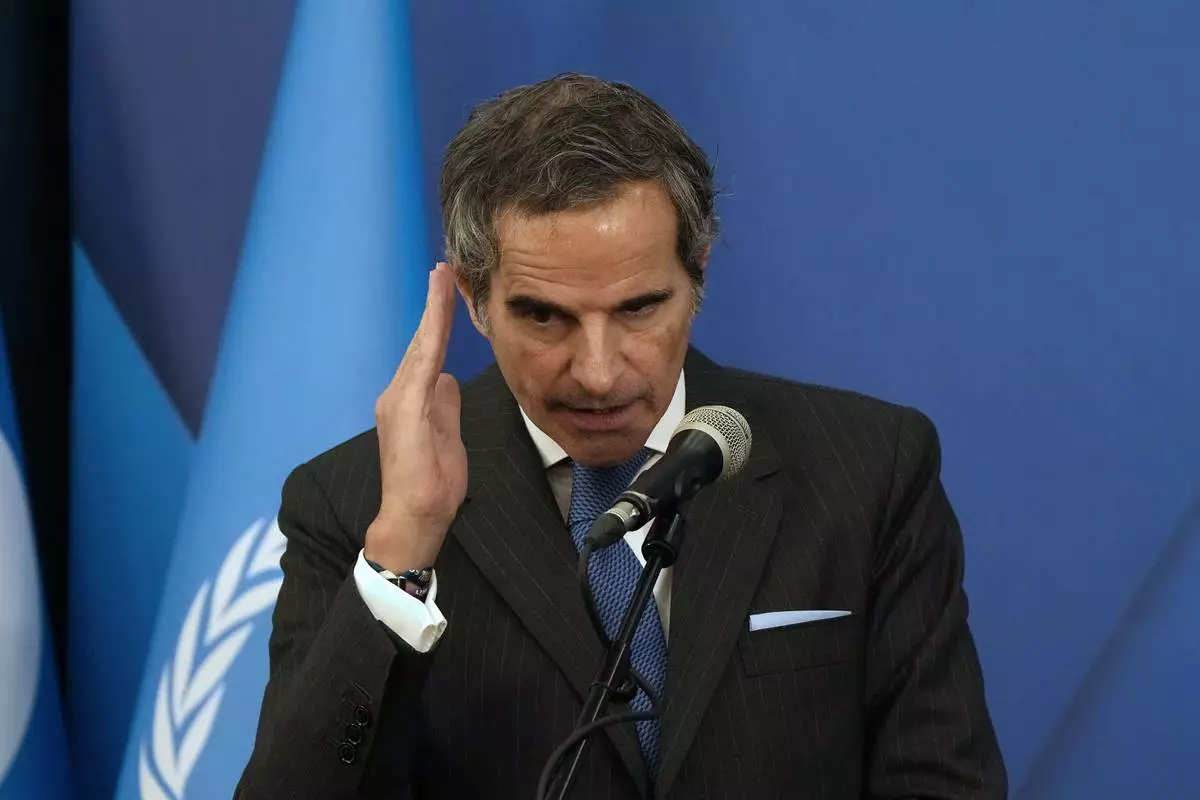
International Atomic Energy Agency, IAEA, Director General Rafael Mariano Grossi speaks during a joint press briefing with Iran's Atomic Energy Organization head Mohammad Eslami in Tehran, Iran, Thursday, Nov. 14, 2024. (AP Photo/Vahid Salemi)
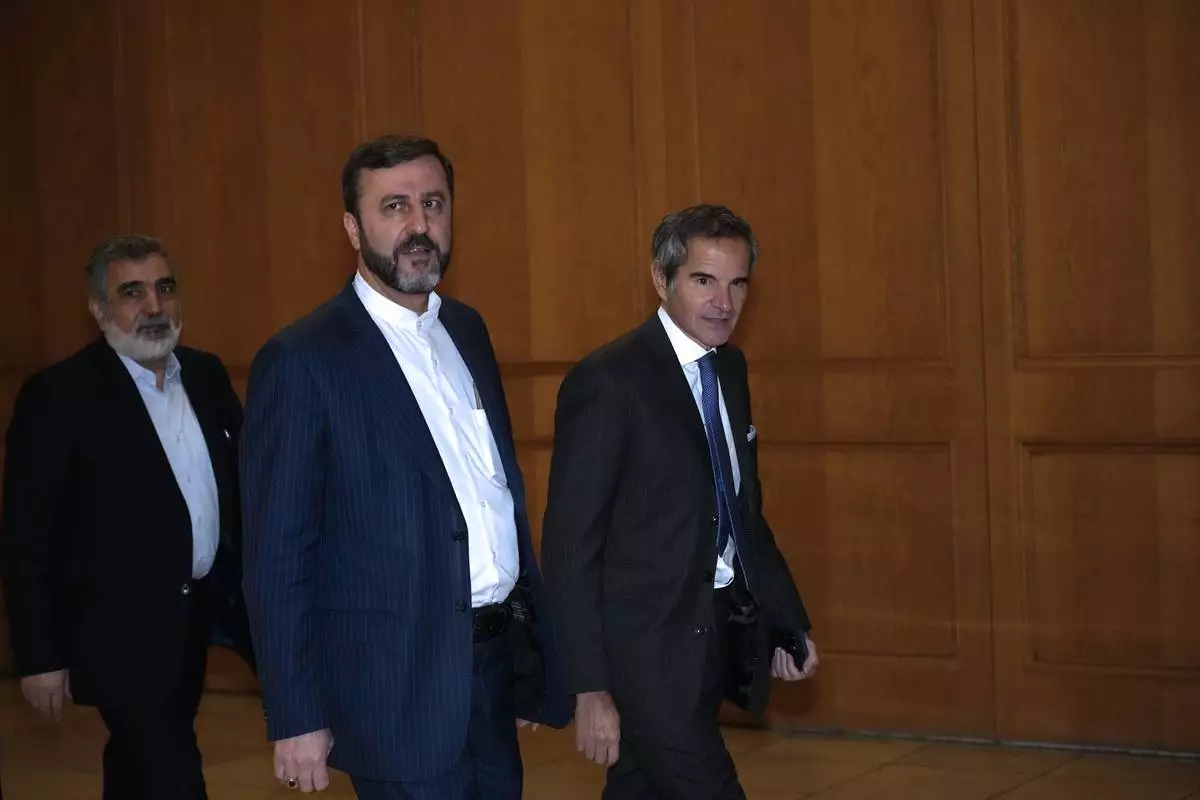
International Atomic Energy Agency (IAEA) Director General Rafael Mariano Grossi, right, arrives for a meeting with Iranian Foreign Minister Abbas Araghchi, unseen, as he is accompanied by Deputy Foreign Minister Kazem Gharib Abadi, second right, and Deputy Chief of Atomic Energy Organization of Iran, Behrouz Kamalvandi in Tehran, Iran, Thursday, Nov. 14, 2024. (AP Photo/Vahid Salemi)
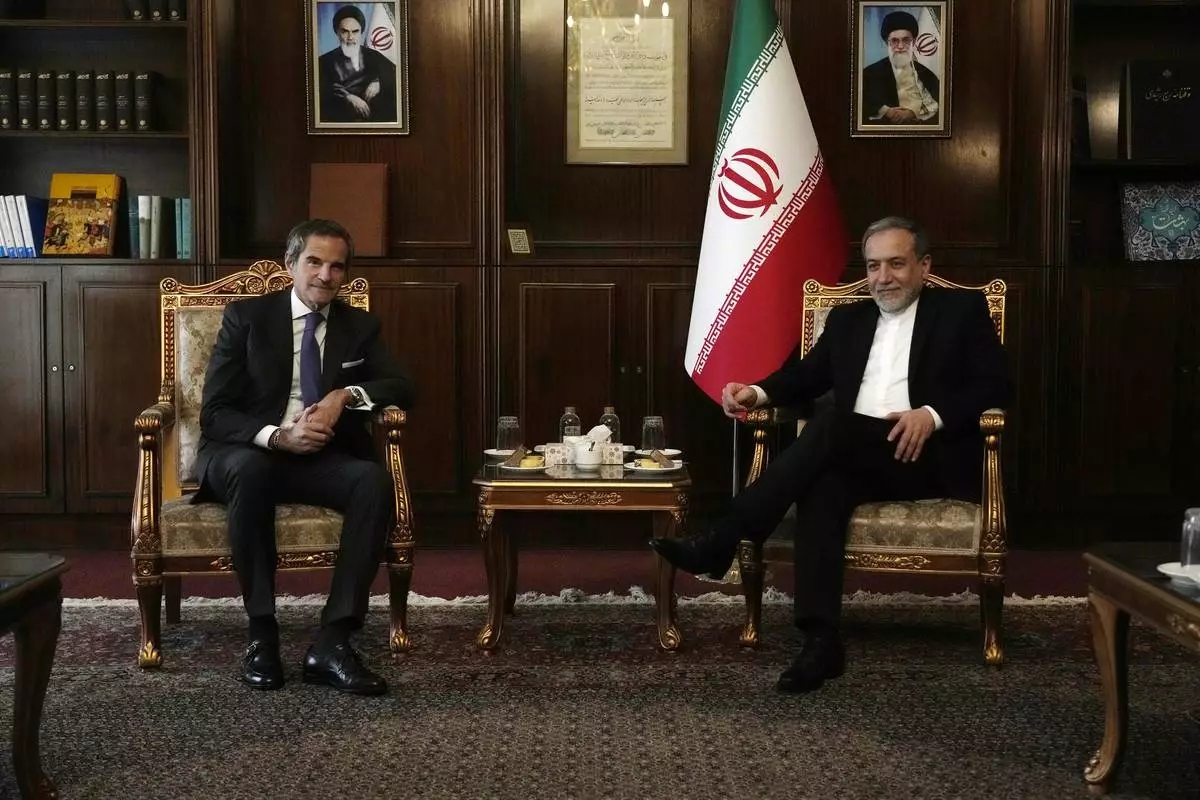
International Atomic Energy Agency (IAEA) Director General Rafael Mariano Grossi, left, meets with Iranian Foreign Minister Abbas Araghchi in Tehran, Iran, Thursday, Nov. 14, 2024. (AP Photo/Vahid Salemi)
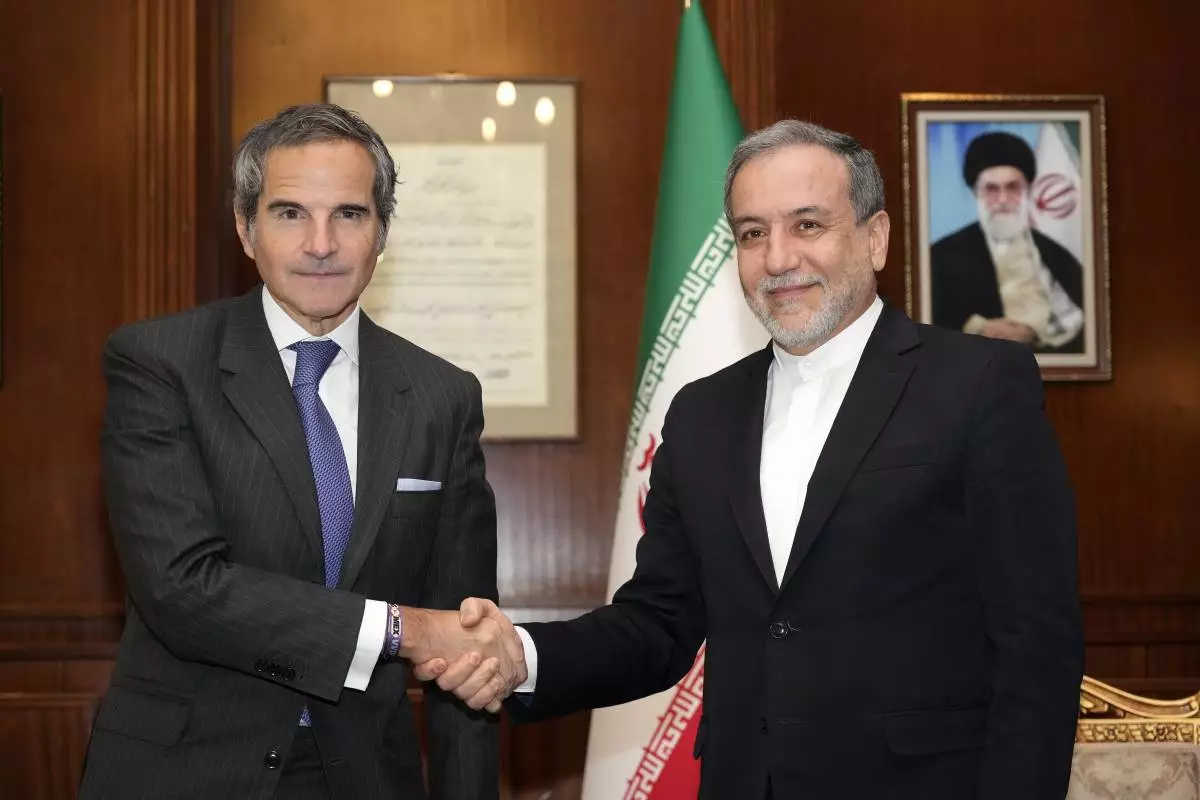
International Atomic Energy Agency (IAEA) Director General Rafael Mariano Grossi, left, shakes hands with Iranian Foreign Minister Abbas Araghchi during their meeting in Tehran, Iran, Thursday, Nov. 14, 2024. (AP Photo/Vahid Salemi)
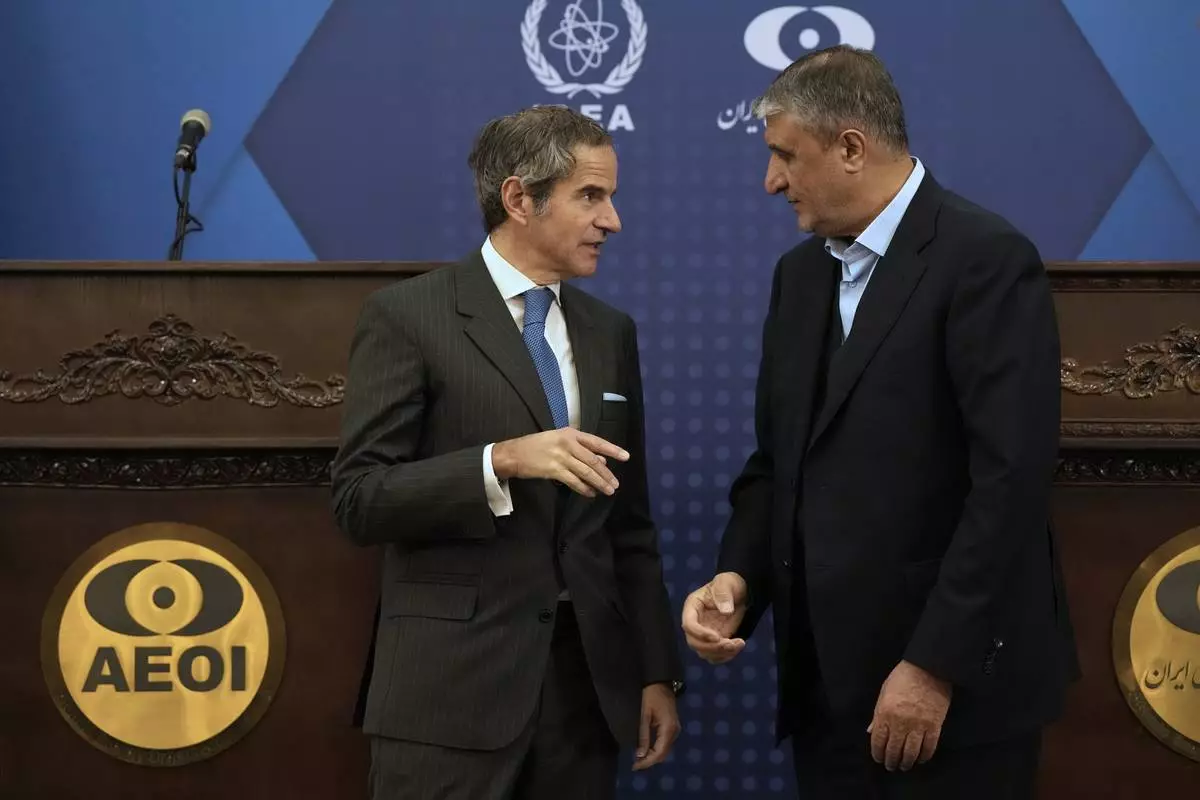
International Atomic Energy Agency, IAEA, Director General Rafael Mariano Grossi, left, talks with Iran's Atomic Energy Organization head Mohammad Eslami at the conclusion of their press conference in Tehran, Iran, Thursday, Nov. 14, 2024. (AP Photo/Vahid Salemi)









